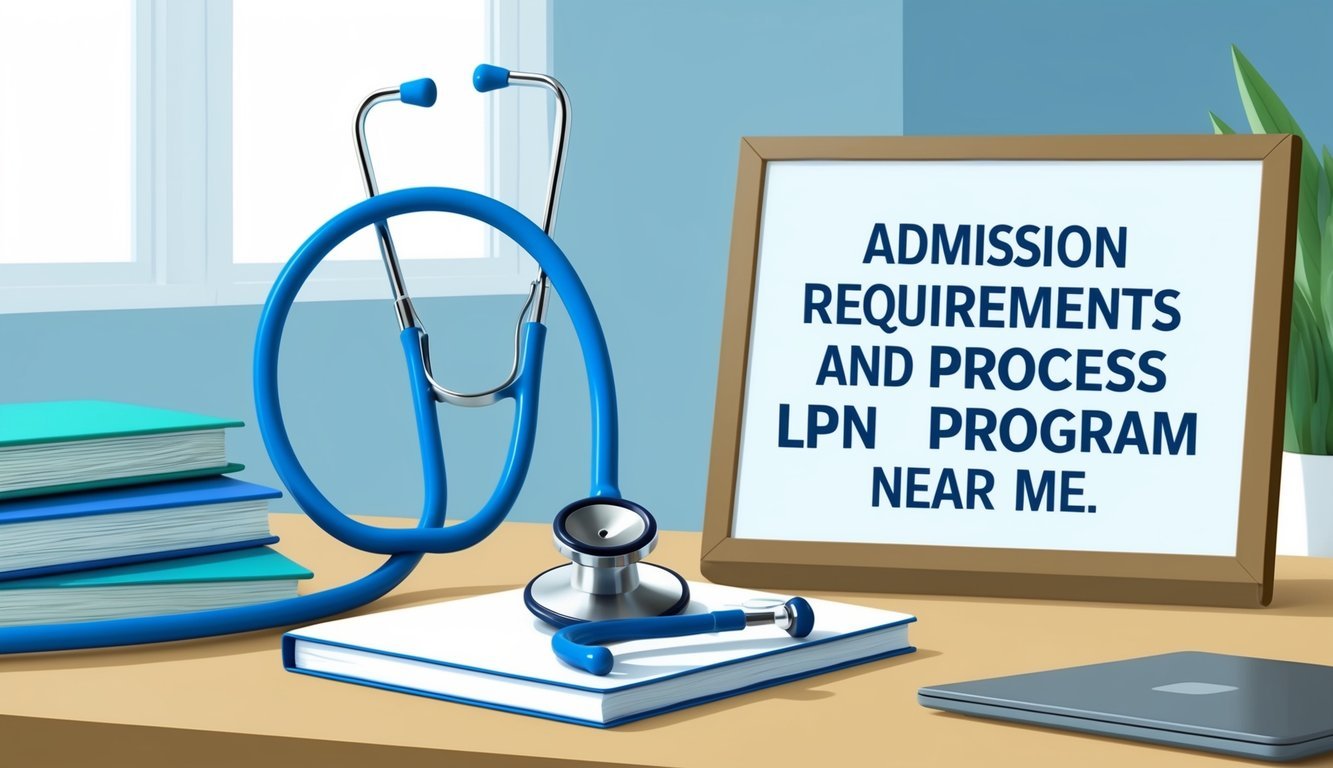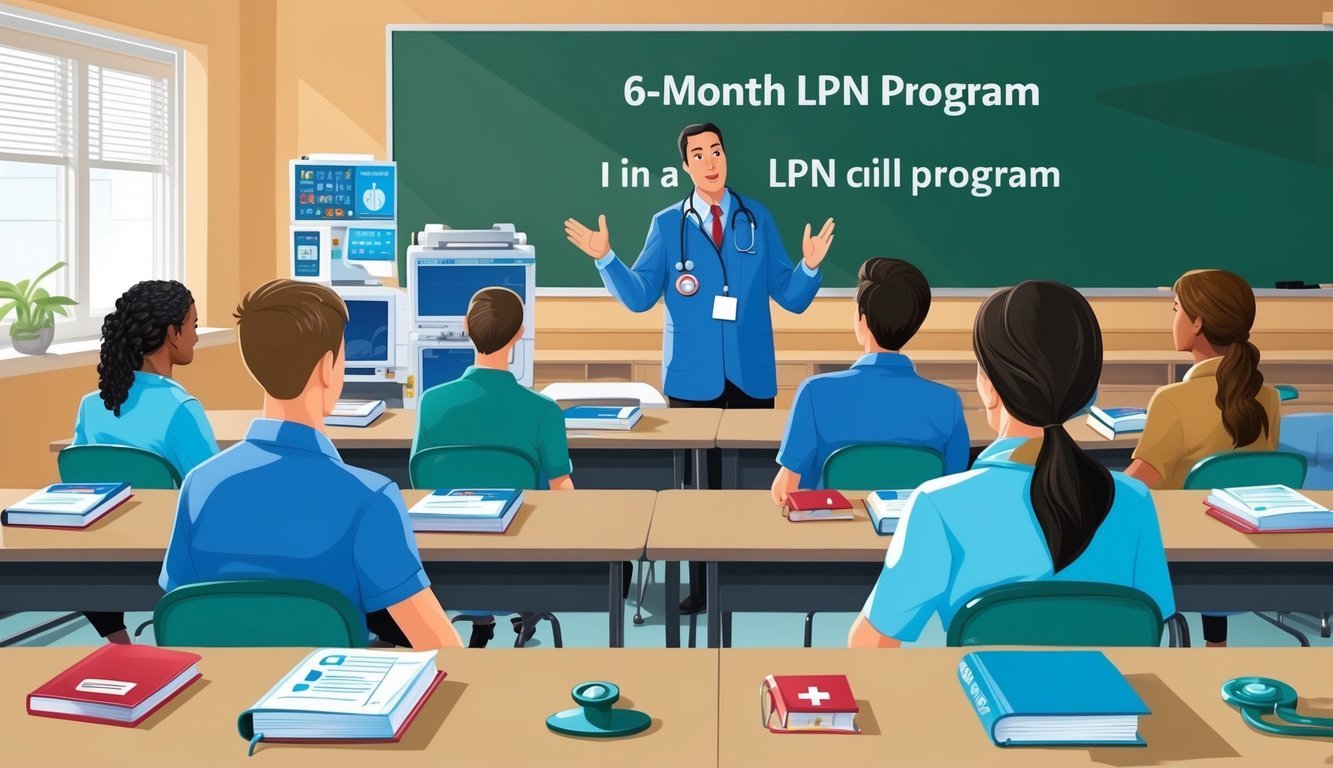If you’re considering a nursing career, you might be wondering about the options available to you in your area.
You might be particularly interested in a 6-month LPN program.
These fast-track LPN programs can provide you with the skills and knowledge necessary to become a licensed practical nurse.
They allow you to enter the workforce sooner than traditional routes.
With hands-on training and focused coursework, these programs are designed to prepare you efficiently for your future career in practical nursing.
The demand for skilled nurses continues to grow, making this a great time to pursue a nursing career.
Many institutions offer various programs that can be completed in as little as six months, both online and on campus, catering to your schedule and learning preferences.
Local colleges and vocational schools may offer accelerated options that align with your goals. By researching and enrolling in a program near you, you can take a significant step towards a rewarding profession that makes a difference in people’s lives.
Exploring your options for LPN programs can lead you to numerous resources that outline the admission requirements, tuition costs, and curriculum details.
This information is essential for making an informed decision that suits your needs and career aspirations.
Whether you opt for a completely online course or prefer a more traditional classroom setting, the right program can launch your nursing career in just six months.
Exploring LPN Programs
When considering a licensed practical nurse (LPN) program, understanding the education structure and ensuring the program’s accreditation is crucial for your career.
Below are essential insights that will guide you through exploring LPN programs effectively.
Understanding LPN Education
LPN programs typically offer both theoretical and practical training.
You can find these programs at community colleges, technical schools, and sometimes online.
The coursework often covers subjects such as:
- Anatomy and Physiology
- Nutrition
- Pharmacology
- Patient Care Techniques
Clinical experiences are integral, providing hands-on training in real healthcare settings.
You may complete clinical rotations in various facilities like hospitals and nursing homes, which help enhance your skills and readiness for licensure.
Most programs require around 1,200 hours of instruction, which can be condensed into 6 to 12 months.
Institutions like Mountainland Technical College offer condensed LPN options that can fit your schedule.
Accreditation and Approval
Accreditation plays a significant role in the credibility of LPN programs.
Programs accredited by the Accreditation Commission for Education in Nursing (ACEN) ensure that they meet high educational standards.
Here’s why accreditation matters:
- Quality Education: Ensures delivery of comprehensive training.
- Eligibility for Licensure: Many states require graduation from an accredited program to sit for the NCLEX-PN exam.
- Financial Aid: Eligibility for federal financial aid often depends on the program’s accreditation status.
When researching programs, verify their accreditation status and approval by your state’s nursing board.
Programs with proper accreditation are more likely to provide you with a robust education, setting a strong foundation for your nursing career.
For a list of accredited programs, your state board’s website can be an excellent resource.
Admission Requirements and Process

When considering a 6-month LPN program, understanding the admission requirements and processes is crucial.
Each program may have unique criteria, but common prerequisites and exam requirements typically apply.
Prerequisites for Enrollment
To enroll in a 6-month LPN program, you usually need to meet several prerequisites.
Most schools require a high school diploma or GED.
Some programs may also ask for specific coursework in subjects like biology and chemistry.
In addition, having certain health-related certifications, such as CPR or basic life support, may enhance your application.
It’s also beneficial to have strong communication skills, as these are vital in nursing.
To clarify, here are typical prerequisites:
| Requirement | Details |
|---|---|
| High School Diploma/GED | Proof of completion is required |
| Prerequisite Courses | Biology and Chemistry preferred |
| Health Certifications | CPR or basic life support certification |
Entrance Exams and Criteria
Many LPN programs require you to take an entrance exam, with the TEAS (Test of Essential Academic Skills) being a common choice.
This exam assesses your skills in reading, math, science, and English, which are crucial for nursing.
Passing scores can vary by institution, so check with each program for specific requirements.
Strong performance in this exam often indicates readiness for the rigorous nature of nursing education.
Other criteria may include interviews or background checks, depending on the school.
Being prepared for these elements can increase your chances of a successful application.
Here’s a brief overview:
| Exam | Focus Areas | Required Score |
|---|---|---|
| TEAS | Reading, Math, Science, English | Varies by institution |
Program Curriculum and Clinical Training

The program offers a comprehensive curriculum that integrates both theoretical knowledge and practical skills essential for nursing practice.
You’ll engage in core nursing courses and clinical training designed to prepare you for a successful career in healthcare.
Core Nursing Courses
In your LPN program, you will complete a series of core courses tailored to build a solid foundation in nursing.
These courses typically include:
- Nursing Fundamentals: Introduces the essential concepts of nursing, emphasizing patient care and safety.
- Pharmacology: Covers medication administration, drug classifications, and patient management concerning medications.
- Anatomy and Physiology: Provides a deep understanding of body systems, essential for nursing practice.
- Medical-Surgical Nursing: Focuses on nursing care for surgical and medically ill patients, enhancing your clinical judgment.
These courses are designed to equip you with the necessary skills to provide high-quality nursing care.
Hands-on Clinical Experience
Hands-on clinical training is a key component of your education.
You’ll participate in clinical rotations within various healthcare settings, including hospitals and nursing homes.
During these rotations, you will:
- Implement nursing theories in real-world situations.
- Gain exposure to diverse patient populations.
- Utilize critical thinking and clinical judgment in decision-making.
This practical experience allows you to develop effective patient care strategies and enhances your confidence for future roles in nursing.
Specialization in Practical Nursing
Your program may offer opportunities for specialization, helping you focus on specific areas of interest.
Specialization can include:
- Geriatric Nursing: Providing care for elderly patients.
- Pediatric Nursing: Focused on the nursing care of children.
- Mental Health Nursing: Addressing the psychological well-being of patients.
Through specialization, you can tailor your education to meet your career goals while receiving training that meets industry standards.
Engaging in this focused learning can enhance your expertise in nursing care and prepare you for a rewarding career in your chosen specialty area.
Online and Accelerated Learning Options
Choosing between various learning methods is crucial when considering a six-month LPN program.
You may benefit from the flexibility of online courses or the fast-paced nature of accelerated programs.
Each option has distinct advantages and considerations.
Advantages of Online LPN Programs
Online LPN programs are designed for flexibility, allowing you to manage your studies around personal and work commitments.
The ability to study from home is a significant advantage, especially for those balancing other responsibilities.
These programs often incorporate a blend of online coursework and in-person clinical experiences, ensuring you receive a well-rounded education.
A six-month online LPN program can minimize the time spent in traditional classes, allowing you to enter the workforce sooner.
Additionally, many institutions offer asynchronous learning, meaning you can complete coursework at your own pace.
This feature can enhance your understanding and retention of material.
Programs may also provide a variety of resources, such as virtual simulations and online libraries, to support your learning journey.
Considerations for Fast-Track Programs
Fast-track LPN programs can be appealing for those eager to expedite their nursing education.
These programs typically condense coursework into a shorter timeframe, requiring intense focus and dedication.
However, it’s essential to consider the rigor of the curriculum.
You will face a high volume of material in a limited time, which can be challenging.
Ensure you are ready to commit to a demanding schedule that combines both theoretical learning and practical training.
Moreover, while fast-track options can lead you to a nursing career sooner, be prepared for potentially higher tuition costs.
Some programs may require additional fees, so reviewing the total financial commitment is wise.
Whether you choose accelerated programs or opt for online formats, evaluate your learning style and career goals to make an informed decision.
Financing Your LPN Education

Financing your LPN education can significantly impact your ability to enroll in and complete a program.
Understanding tuition costs, financial aid, and various scholarship opportunities will help you manage these expenses effectively.
Tuition Costs and Financial Aid
Tuition for LPN programs varies widely based on several factors, including institution type and location.
Generally, you can expect costs to range from $10,000 to $20,000 for a 6-month program.
Some schools may offer lower tuition, while others, especially private institutions, may charge more.
Aside from tuition, you should consider additional expenses such as books, supplies, and clinical fees.
Many programs provide financial aid options, such as federal grants, loans, and state assistance.
It’s essential to fill out the FAFSA application early to determine your eligibility for various financial aid options.
Scholarship and Aid Opportunities
Numerous scholarships and aid programs are available specifically for nursing students.
Some options include:
- Workforce Scholarships: Offered by states to encourage individuals to enter high-demand fields like nursing.
- Private Scholarships: Various organizations provide scholarships based on merit or need, covering tuition partially or fully.
Local community colleges and professional organizations often have scholarship funds available.
You should also check with your chosen school for any specific scholarships they may offer.
Make use of resources like Fastweb or College Board to search for scholarship opportunities tailored to nursing students.
Approaching financial planning with thorough research can ease the burden of education costs.
Preparing for the NCLEX-PN Exam
Preparing for the NCLEX-PN exam is a crucial step in becoming a licensed practical nurse.
This exam assesses your knowledge and skills to ensure you are ready for practical nursing.
Here are some essential tips to help you effectively prepare:
-
Understand the Exam Format
- The NCLEX-PN consists of 85 to 205 questions.
- You have up to five hours to complete the exam.
-
Study Resources
- Utilize online platforms like Simple Nursing to access focused study materials.
- Consider enrolling in NCLEX-PN review courses.
-
Create a Study Schedule
- Dedicate specific times for studying each week.
- Include breaks to maximize retention and avoid burnout.
-
Practice Questions
- Incorporate practice tests into your routine.
- Aim for a variety of questions to simulate the exam experience.
-
Focus on Key Topics
- Prioritize areas such as safety, health promotion, and patient care.
- Review the NCLEX-PN Test Plan for a breakdown of important subjects.
| Study Tips | Actions |
|---|---|
| Understand exam format | Familiarize yourself with the structure |
| Use reliable resources | Access review courses and materials |
| Simulate test conditions | Practice under timed constraints |

